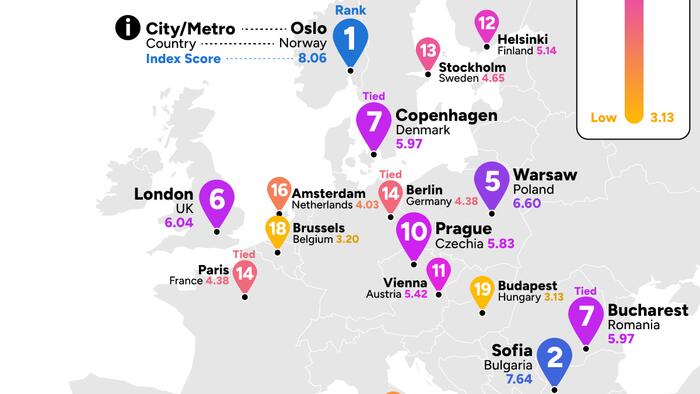Metro stations are essential to urban life, but their quality and level of modernization vary across Europe’s capital cities.
High-quality transportation networks play a crucial role in driving business productivity by enhancing mobility and expanding access to a broader labor pool. Moreover, investment in metro systems is connected with higher foreign direct investment. These investments boost a city’s appeal by improving commuting speed and accessibility.
This graphic, via Visual Capitalist’s Dorothy Neufeld, ranks the metro systems of European capital cities, based on data from Bounce.
Methodology
For the ranking, metro systems across 19 European capital cities were scored according to the following metrics:
Due to travel advisories, Belarus, Ukraine, and Russian capitals were excluded. Overall, metro systems were measured out of a score of 10.
Norway is Home to Top Metro System in European Capitals
Oslo, the capital of Norway, tops the list with 101 metro stations across its transit network.
In 2023, it became the first metro system in the world to operate entirely on electric power. As the largest network in Scandinavia, Oslo’s metro stations earned an average Google review score of 4.13 out of 5 stars, with users often saying they were “very well organized” and “easy to get around”.
Sofia, Bulgaria, claims second place with the newest metro system among European capitals, established in 1998.
In contrast, the London Underground, built in 1863, holds the title of the world’s oldest metro system. Today, the London Underground emits 84% fewer carbon emissions per passenger than a gasoline car, and it’s on track to be fully powered by renewables by 2030. Overall, London’s metro system ranks sixth among European capitals.
Copenhagen’s automated metro runs 24/7, with trains arriving every two minutes during most of the day. Despite placing seventh on the list, it is frequently recognized as the world’s best metro system due to its exceptional reliability.
At the other end of the spectrum, Budapest’s metro system ranks last, with 75% of online reactions to transport-related news articles being negative. Passengers have described some metro stations as “rather unpleasant,” with cleanliness often cited as a major concern.
To learn more about this topic from a global perspective, check out this graphic on different transportation methods around the world.
Loading…
Read the full article here

